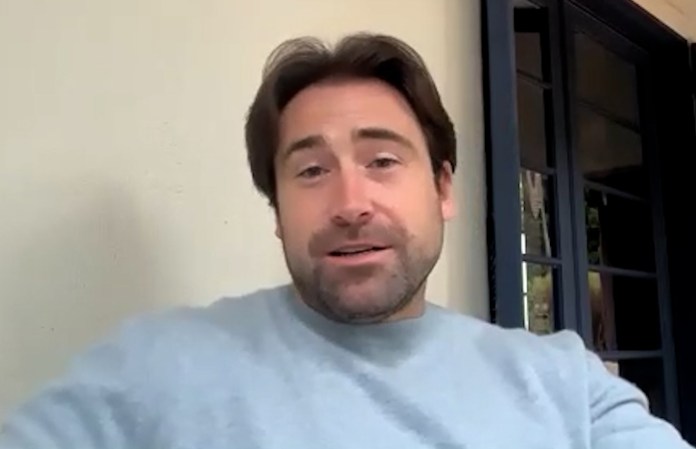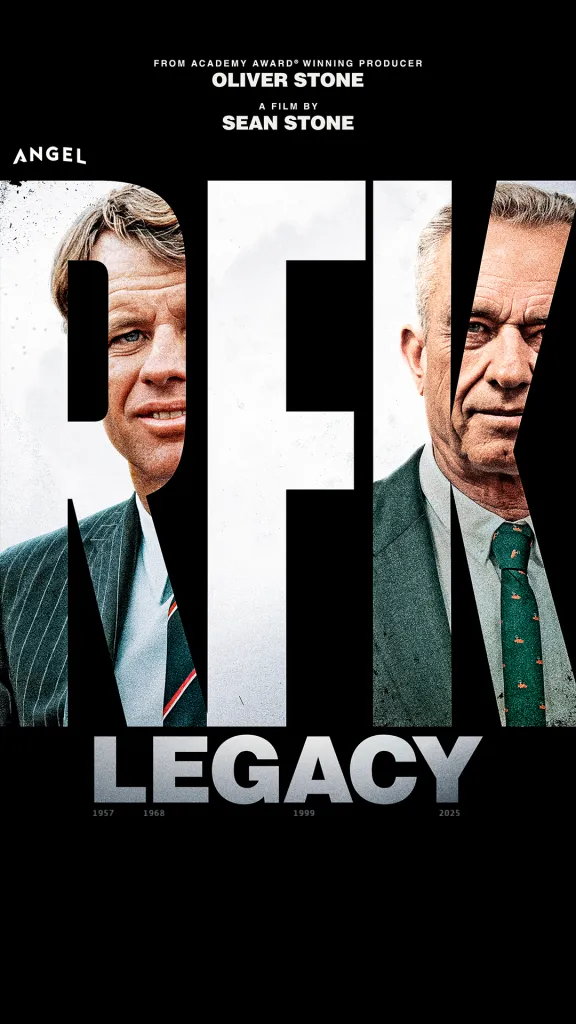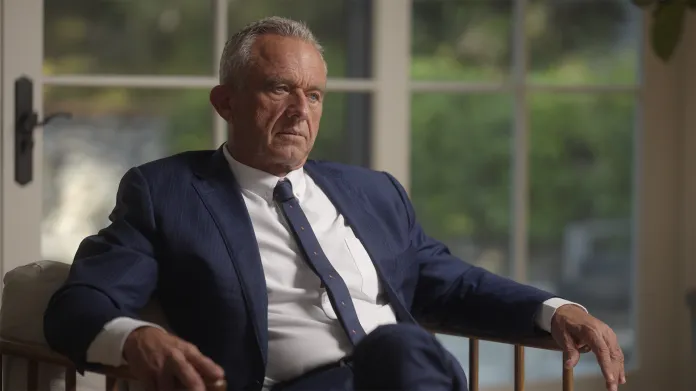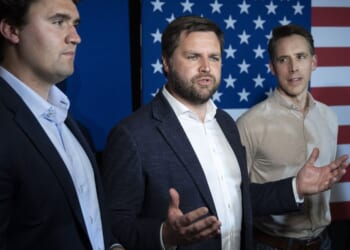The life and legacy of one of the most influential political families in America is uncovered in Angel Studios‘s latest film, RFK: Legacy.
The documentary, directed by Sean Stone, features exclusive interviews with Robert F. Kennedy Jr., those close to him and his father, and historians to tell the story behind what drove these two men into public service.

“It’s really a father-son story,” Stone said in an exclusive interview with the Washington Examiner. “It was about their missions. It was about showing this battle with the establishment in different ways.”
Premiering one day after the assassination of conservative activist Charlie Kirk and one year after two attempted assassinations of President Donald Trump, the film is unintentionally timely as it focuses on three assassinations: those of John F. Kennedy, Robert F. Kennedy, and Martin Luther King Jr.
“I felt certain parallels when I started making this film in 2024 with 1968 because of the revolutionary character of that time period,” Stone said. “We’re addressing contemporary issues. Political assassination we didn’t know would become such a contemporary issue, as the day before we released the film, Charlie Kirk was killed.”
Other parallels from the 1960s to now featured in the film, Stone mentioned, were unpopular foreign wars, from Vietnam to now Ukraine, clashes between police and students from the Guardsmen at the Democratic National Convention in 1968 to the pro-Palestinian protests that took over college campuses, and black power movements from the Black Panthers to Black Lives Matter.
“There’s so much chaos in this time. It’s just kind of a Wild West,” Stone said about the 1960s. “I felt that energy in 2024 now into 2025 because you’ve unleashed these forces. I’m hoping Trump does better than what Nixon ultimately did in ending the Vietnam War. I would really hope Trump brings this Ukraine war to a conclusion more quickly. It’s in his power.”
Stone also mentioned there are still so many unknowns in the assassination of Kirk and the attempts on Trump’s life. However, both were instances of murders caught on camera. RFK: Legacy shows graphic images of RFK’s death. Stone, who is the son of filmmaker and RFK: Legacy producer Oliver Stone, believes sharing these images with the public is important to the story and the investigation into the conspiracy behind the murders.
“When my father’s film, JFK, came out, that was the first time that the majority of the public saw the Zapruder film,” Sean Stone said. “So actually playing the video, many people criticized it. They said, ‘This is exploitation.’ ‘This is like a snuff film,’ to show the president’s head being blown out. But my father, as a storyteller, felt we had to analyze the evidence of it.”
In the same sense, Sean Stone believes the video of Kirk should not be censored and questions the firings of those speaking out against him. He thinks it is a slippery slope to the end of free speech.
“I hope that the right doesn’t get extreme in its reaction now with censoring people the same way that the left censored people,” Sean Stone said. “Just because the left did, it doesn’t mean the right should turn around and do the same thing to make it even. It’s like, no, we need to keep open debate and discussion in this society, that’s what makes us a free country.”
Sean Stone has his own experience of censorship from the left. In 2020, his YouTube channel was shut down for questioning the COVID-19 vaccine and opposing lockdowns.
“We’re supposed to believe our government is a good entity, but there’s a lot of people inside the government that are corrupt,” Sean Stone said. “I mean, I think Fauci was an exemplar of that corruption. If there’s a Fauci in the government for decades, then there might be Fauci types in the CIA. There are Fauci types in the FBI. There are Fauci types in the State Department.”

Government corruption is a major theme in RFK: Legacy. The documentary details how then-CIA Director Allen Dulles hid the Bay of Pigs invasion from JFK, which led him to be distrusting of his own State Department, Pentagon, and CIA. The film explains RFK was given so much responsibility as attorney general because JFK felt his brother was the only person he could trust. RFK was unofficially watching over the CIA; he was put in charge of relations with Cuba as a part of his anti-communist task force, on top of his mission as attorney general hunting organized crime. During JFK’s time in office, the brothers battled against the CIA on whether or not to invade Cuba and kill Fidel Castro, who was the prime minister of Cuba at the time. All of JFK’s advisers wanted to bomb Cuba, but JFK felt it would escalate to nuclear war. Historians in the documentary explain that even after firing Dulles, the CIA went rogue to try to take down Castro.
“I mean the insubordination of the CIA against the Kennedy brothers is shocking to me,” Lisa Pease, author of A Lie Too Big to Fail: The Real History of the Assassination of Robert F. Kennedy, says in the film. “Without Bobby, there is no guarantee America, or any of us, would be here today.”
Sean Stone feels the death of JFK changed his brother. RFK felt the CIA had involvement in his assassination and the only way to find out the real answers was to make it back to the White House with the power of the presidency.
“There is definitely a major component of his ambition to become president was to figure out what happened to his brother but I also think to continue what his brother was doing,” Sean Stone said.
“I’m sure he wanted to finish his fight with the CIA that his brother started. When his brother said, ‘We need to smash the CIA into 1,000 pieces,’ he probably wanted to do that,” Sean Stone said with a laugh.
In the film, Kennedy Jr. reveals due to his love of pets and nature, he initially wanted to be a veterinarian. When his father died, he felt he needed to pick up his father’s work, which inspired him to change his path. It influenced his decision not only to go to law school but also the same universities his father attended.
“Jr., you know, again, carrying on his father’s and his uncle’s legacy,” Sean Stone said. “I feel he felt that there was a public duty.”

However, Kennedy Jr.’s struggle with addiction held him back for more than a decade. In the film, he speaks candidly about how he got hooked on crystal meth and heroin at 15 years old. Kennedy Jr. says a public overdose on a plane and getting caught is finally what got him clean at 28 years old, in 1983.
“When I got off the plane, the police were waiting for me,” Kennedy Jr. said. “It’s probably the best thing that ever happened to me because I had such a fear that my addiction was going to get in the newspapers. At this point, everybody knew I had the problem, so I could start talking about it, and that was the beginning of my recovery.”
Now Kennedy Jr. has made it and is a sitting Cabinet member in the White House as the Secretary of the Department of Health and Human Services. Trump has signed executive orders to release the documents on his father’s and uncle’s deaths. Unfortunately, Sean Stone believes this is not enough to give him closure.
“I don’t think he’s happy at all that they’re still slow walking the release of files,” Sean Stone said. “I’ve heard a lot of the documents are still blacked out. I don’t think he’s gotten the information he was hoping to get from the files, and I don’t know that we ever will.”
One of the most poignant parts of the film is when Kennedy Jr. outlines trying to find meaning in one of his last interactions with his father. Kennedy Jr. recalls his father telling him with “unusual intensity” to read the book The Plague by Albert Camus. The novel centers on a doctor who must decide whether or not to enter a city quarantined by a plague, knowing he may die if he leaves his home, though it is the only way to help those who are sick.
RAPID RETRIBUTION: REPUBLICANS GET THOSE WHO CELEBRATE CHARLIE KIRK’S DEATH FIRED
“After he died, I read the book several times trying to kind of unlock the key of, you know, what message he had been trying to tell me,” Kennedy Jr. recalled. “This doctor, he accepted his burden and he did his duty, and it brings a sense of well-being. You’re doing what you’re supposed to do. And for me, it makes sense, because I find that the best way for me to live is to make the effort to do the next right thing, to get up every morning, say, ‘Reporting for duty, sir,’ and then let go of the results. … The outcome’s in God’s hands.”
RFK: Legacy is now streaming exclusively at Angel Studios.

















